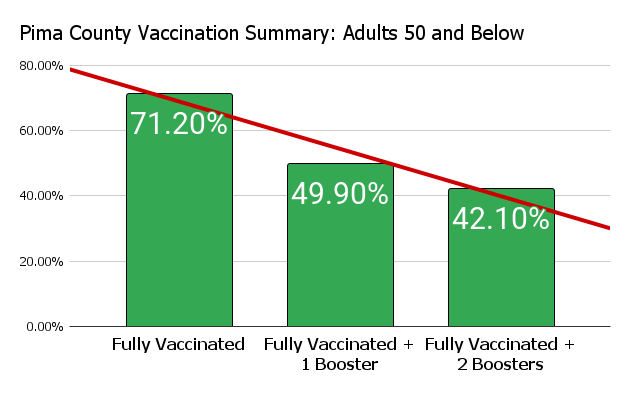The newest round of COVID-19 booster shots is now available at the University of Arizona.
According to a Campus Health press release, the FDA-approved boosters became available to all students, faculty and staff on Sept. 14.
The bivalent booster shot provides protection against the highly transmissible Omicron variant of the virus, which is still a dominant strain according to Dr. Richard Carmona, the former U.S. Surgeon General and a Professor Laureate of Public Health at the UA.
Amy Blackburn, Campus Health Center’s immunization and infection prevention manager, suggests people follow the Center for Disease Control and Prevention’s guidance on “mixing and matching” their booster doses for optimal protection. For example, if a patient’s initial vaccination was Pfizer, the CDC recommends getting a Moderna booster and vice versa. Both vaccine manufacturers are offered on campus, Blackburn said.
Appointments are available Wednesdays and Fridays from 9 a.m. to 12:30 p.m. at the Campus Health Center at 1224 E. Lowell St.
In general, uptake of booster shots drops off as consecutive doses become available, with only about 42% of individuals 50 or younger in Pima County receiving the second booster, according to the CDC. COVID-19 exhaustion or vaccine hesitancy is to blame for this, Carmona said.
“I do understand that everybody’s tired, but we encourage everybody that is able to get a booster, to get the booster,” Carmona said.
If patients have had COVID-19 recently, Carmona recommended waiting a few months to get boosted since getting sick provides immunity for a limited time.

For the past week, the university’s COVID-19 Dashboard shows a positivity rate of about 4.6%. Cases in the dorms remain below 1%, and off-campus students hover above 6%. However, these numbers reflect only the people that choose to get tested. Tracing the virus is becoming more logistically difficult as COVID-19 regulations relax, said Carmona.
After almost three years of the pandemic, it’s “assumed that almost everyone has been exposed at this point,” Carmona said. “A lot of the discussion now has been, is it really necessary to keep tracking the virus the way we have been?”
Carmona said the county has begun testing wastewater to measure community levels of the virus, indicating a shift in how the disease is tracked.
Teagan Whipple, a recent graduate of Arizona State University, had COVID-19 over the summer. She said she didn’t feel the need to report it when she got a positive test because she felt prepared.
“Everyone around me had already had it or known someone who did, and it was the era of the less severe strain,” Whipple said.
With less severe variants and immunity provided by vaccinations, hospitalizations and deaths are low. People aren’t getting as sick, either, with up to 50% of cases being asymptomatic, Carmona said. However, experts urge Arizonans to not get too comfortable, especially if they haven’t been vaccinated.
Healthcare workers like Blackburn say that COVID-19 is still a big deal for the immunocompromised and unvaccinated but that people realize the risk of death from the virus is much lower than it was in 2020.
“When somebody says they have COVID[-19], you don’t just go right to, ‘Oh my gosh, are they going to be OK?’ And that’s because they’ve been vaccinated, and I know they have pretty good protection against getting really sick,” Blackburn said.
“The virus keeps changing to stay alive in our environment,” Carmona said. “The way to extinguish that is to get everybody vaccinated.”
Students can now make an appointment for the latest booster on PatientLink. Patients should remember to bring their vaccine cards to their appointment.
*El Inde Arizona is a news service of the University of Arizona School of Journalism.
Follow the Daily Wildcat on Twitter















